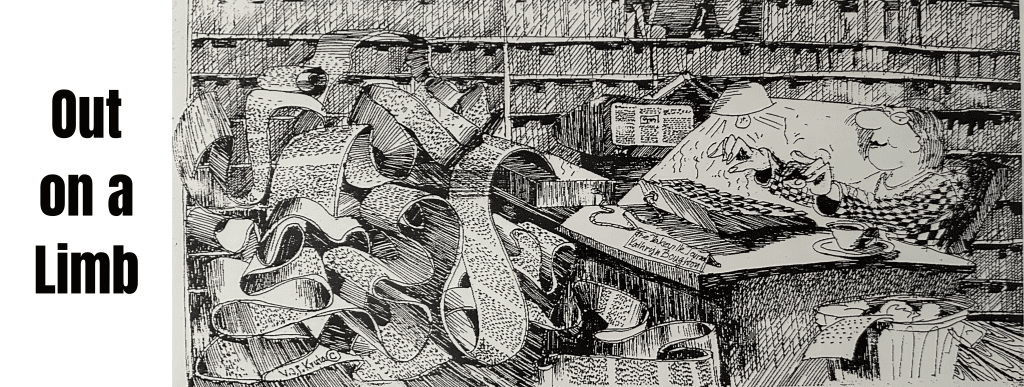Have you noticed how Americans are shortening everything when it comes to written language?

It started back in 1963 when the United States Postal Service standardized most state abbreviations to two letters, making room for the new five-digit ZIP code. Thus, Connecticut, the anglicized version of the Algonquian word Quinnehtukqut, was dramatically truncated to CT.
Fine. Writing addresses can be tedious, especially at Christmas when faced with a pile of holiday cards.
Grammatically, it was designed for the postal service but now it has insinuated itself into many other uses.
Just look at the Connecticut State Colleges & Universities’ description of itself: “CSCU is a system of 6 public colleges and universities: 4 CT state universities, CT State Community College, and Charter Oak State College.”
Really, people! The wording of this phrase is unwieldly enough, but would your fingers fall off if you typed out the numerals and the state’s proper name?
It’s CT this, CT that, but, worse, we have taken to substituting abbreviations and acronyms everywhere—especially in text communications. Saves time pecking at tiny buttons on your phone, I suppose, but at what cost to the language?
I fear linguistic elegance and eloquence are endangered species.
When contemplating this, my thoughts turned to the most remarkable love letter I know of—Union Major Sullivan Ballou’s farewell epistle to his wife on the eve of the first Battle of Bull Run in 1862.
A week later, Ballou was dead, but his letter is timeless. I wondered how this letter, which throbs with emotion, would sound today if sent via a text message.
Here is an abbreviated version of the original letter for those unfamiliar with it:
My Very Dear Wife:
Indications are very strong that we shall move in a few days, perhaps to-morrow. Lest I should not be able to write you again, I feel impelled to write a few lines, that may fall under your eye when I shall be no more.
If it is necessary that I should fall on the battlefield for my country, I am ready. I have no misgivings about, or lack of confidence in, the cause in which I am engaged, and my courage does not halt or falter. I know how strongly American civilization now leans upon the triumph of government, and how great a debt we owe to those who went before us through the blood and suffering of the Revolution, and I am willing, perfectly willing to lay down all my joys in this life to help maintain this government, and to pay that debt.
Sarah, my love for you is deathless. It seems to bind me with mighty cables, that nothing but Omnipotence can break; and yet, my love of country comes over me like a strong wind, and bears me irresistibly on with all those chains, to the battlefield.
The memories of all the blissful moments I have spent with you come crowding over me, and I feel most deeply grateful to God and you, that I have enjoyed them so long. And how hard it is for me to give them up, and burn to ashes the hopes of future years, when, God willing, we might still have lived and loved together, and seen our boys grow up to honorable manhood around us.
If I do not return, my dear Sarah, never forget how much I love you, nor that, when my last breath escapes me on the battlefield, it will whisper your name.
Forgive my many faults, and the many pains I have caused you. How thoughtless, how foolish I have oftentimes been! But, O Sarah, if the dead can come back to this earth, and flit unseen around those they loved, I shall always be near you in the garish day, and the darkest night, always, always. If the soft breeze fans your cheek, it shall be my breath; or the cool air cools your throbbing temples, it shall be my spirit passing by.
Sarah, do not mourn me dead; think I am gone, and wait for me, for we shall meet again.
—Sullivan
Here is what it might have looked like in a text:
DW [Dear Wife],
TIL [Today I learned] we shall move in a few days; TBD [to be determined]. JIC [Just in case] we never again MIRL [meet in real life.], I feel impelled to write u a PM [private message.]
If I die for my country, NP [no problem], I am ready. YOLO [you only live once]. IK [I know] American civilization now leans upon the triumph of government, and how great a debt we owe to those who went before. I am willing, perfectly willing, to lay down all my joys in this life to help maintain this government, and to pay that debt.
Sarah, u will be FIMH [forever in my heart] and yet, the CTA (call to action) comes over me like a strong wind and bears me irresistibly on to the battlefield.
The memories of all the blissful moments I have spent with u come crowding over me, and I TY [thank you] and God, that I have enjoyed them so long. NGL [not gonna lie,] it’s hard for me to give them up, and burn to ashes TFW [the feelings when], God willing, we might still have lived and loved together, and seen our LOs [little ones] grow up to honorable manhood around us.
If I do not return, DW [darling wife], remember you are BAE [before anyone else], that u are the LOML [love of my life].
Forgive my many faults, and the many pains I have caused you. How thoughtless, how foolish I have oftentimes been! But, O Sarah, if the dead can come back to this earth, and flit unseen around those they loved, I will be BTS [behind the scenes] in the garish day, and the darkest night. IFYP [I feel your pain.]
Sarah, do not mourn me dead; think I am gone, and wait for me, for I will CUL8R [see you later.]
—Sullivan
Loses something, doesn’t it. Now, Sullivan Ballou was something of a poet and I doubt that Sarah penned at the bottom of her handwritten letter “TL; DR” [too long; didn’t read], but she might not have wanted to wade through the obscurity of the acronyms in the text.
For me, language is delicious. The flow and cadence of words, the sometimes surprising juxtapositions of sounds, the exposition of ideas—it is all magic and so malleable. We can make it do whatever we want, but all too often we treat it as a burden to be pared to the core.
So why is the overuse of CT so offensive to me? Perhaps because, visually, it negates the flow of the word. Connecticut when written out invites readers to follow the word’s rhythm, the rise and fall of its syllables.
When my eye encounters CT, there is no melody. My brain records just one small, staccato sound. How long before the original word begins to disappear entirely from our vocabulary?
Do you want to live in a mailbox?
Kathryn Boughton is editor of the Kent Dispatch. Her views do not necessarily reflect those of Kent News, Inc, the news site’s parent company.































BKrasne
November 14, 2024 at 1:53 pm
KB (Kathryn), Our most esteemed editor, I do so much appreciate your bringing us this piece of history and your riff on the letter. The question is, what -if anything- have we gained with our brevity. Perhaps some readers of The Kent Dispatch will tell us that.
Andrea Schoeny
November 15, 2024 at 2:37 pm
This did make me LOL, frfr. 😁😉
(laugh out loud)
(for real, for real, as in “actually”)